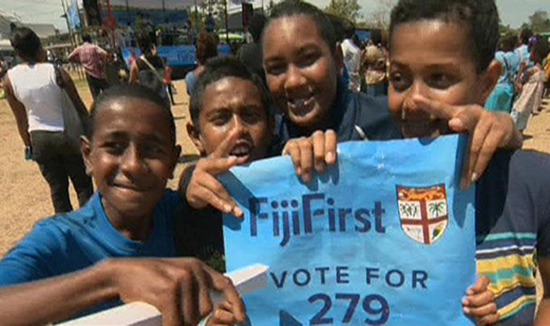
Mainstream media, especially television, gives attention to negativity and conflict, and in the lead up to the 2014 elections, the conversations created through New Zealand’s media focused on the consequences of a potential fifth coup d'état. News stations reported on local Fijians protesting Voreqe Bainimarama’s visit to Auckland and Bainimarama’s disagreeable relationship with John Key.
The purpose of this research was to analyse Television New Zealand’s OneNews coverage of the Fiji elections through a peace journalism framework. With the use of categories validating or disproving the use of peace journalism qualities, this study aims to provide insight into how mainstream television news in New Zealand is structured and to provide conclusions on the use of peace journalism in a Pacific setting to the effect of prescribing journalism best practice in New Zealand and the Pacific region.
Two news items from OneNews’ coverage were selected to be transcribed and analysed in accordance with six categories (formed as questions), used to examine the extent to which peace journalism qualities are used. Peace journalism is a pathway of the practice that gives priority to conflict resolution and is the opposite to conflict or war reporting; a framework used more commonly in reporting on conflict.
Although peace journalism values were found to be used, both news items conformed to the dominant form of news, in favouring violence over peace oriented reporting. The results of this content analysis reveal that the coverage is characteristic of mainstream television news focusing on the more dramatic impacts and negative outcomes. The brief nature of the items does not allow for deeper clarification or, as a peace journalism framework allows, extensive coverage. The prominence given to certain labels and language provides an overall view of the conflicts in Fiji and rules out alternative opinions, views and information.
Researchers and practitioners who have worked throughout the Pacific believe there is a place for peace journalism in the region. Peace journalism may provide a pathway to conflict resolution, but also provides journalists with a more responsible approach to reporting, giving other perspectives to conflict.
Kata, Alistar (2015). Peace journalism in New Zealand news media: a study on the coverage of the 2014 Fijian general election by Television New Zealand's OneNews through a peace journalism framework. Unpublished Bachelor of Communication Studies (Honours) dissertation, School of Communication Studies, Auckland University of Technology. Dissertation available at AUT Library: http://libsearch.aut.ac.nz/iii/encore/record/C__Rb1478086?lang=eng


